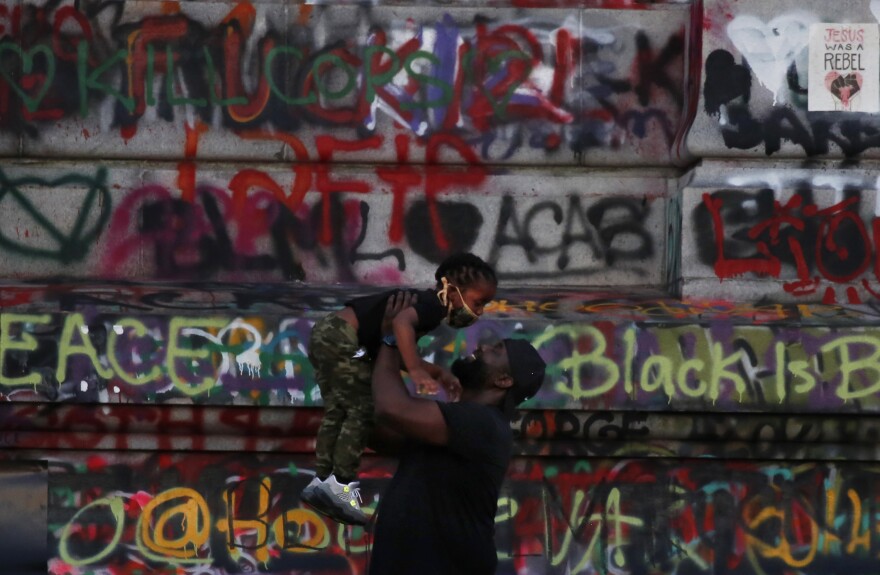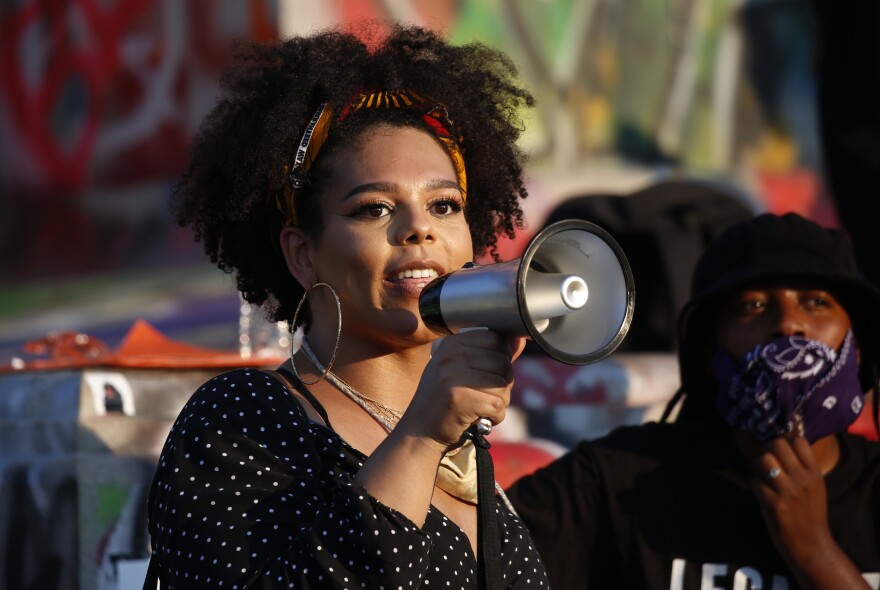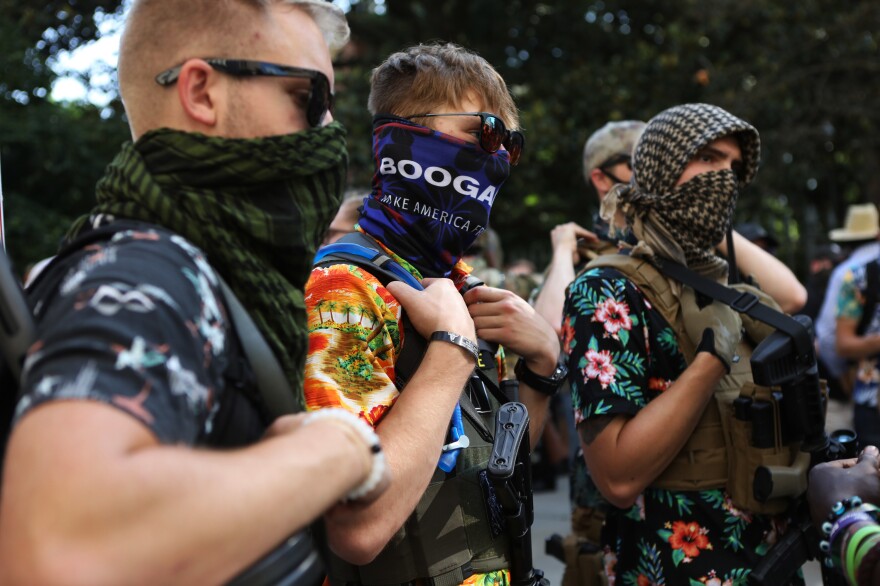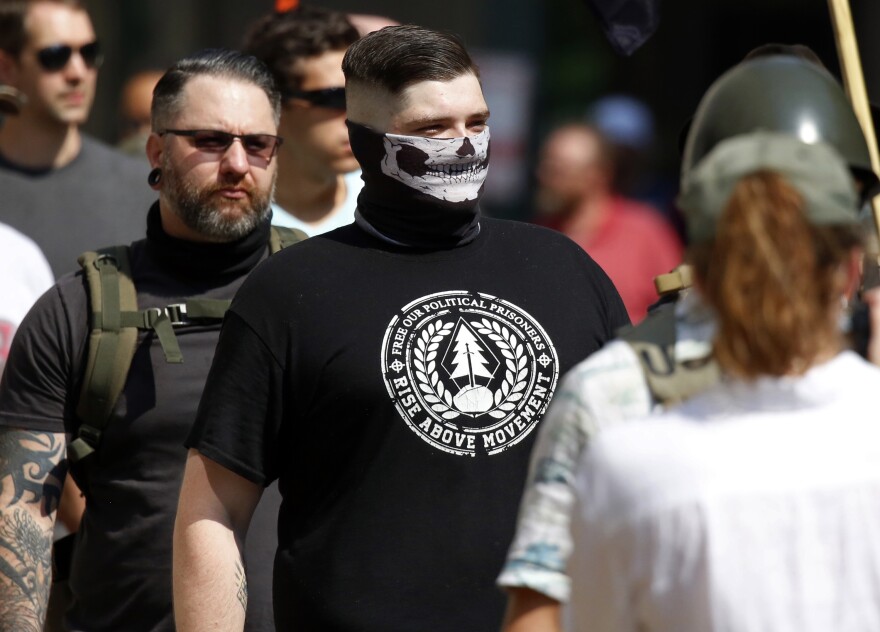Robert E. Lee's days are numbered.
A landmark statue of the Confederate general installed 130 years ago in Richmond, Va., is at the center of a campaign to remove monuments that glorify the losing side of the Civil War. There's a legal battle over whether to remove the Lee statue, but few here expect his monument to survive the re-energized anti-racism movement sparked by the killing of George Floyd.
So, until the day a crane shows up to haul off the general, Black protesters and their supporters are camped out at the site, which has become a place of pilgrimage. Over the Fourth of July weekend, there were songs and speeches and families coming to take photos. Their backdrop was a Confederate hero whose legacy is challenged in graffiti on the pedestal that holds him up.

Near the top, someone had scrawled, "Proverbs 29:16." The biblical verse reads: "When the wicked thrive, so does sin, but the righteous will see their downfall."
Black protesters said taking down statues is symbolic; the bigger fight against institutionalized white supremacy is longer, open-ended.
The lingering opposition to that cause also was on display this weekend, outside the Virginia State Capitol at a gathering of heavily armed white men – some prepping for a second Civil War, some calling for a white ethnostate. Their speeches were essentially the overtly racist version of President Trump's divisive lament at Mount Rushmore National Memorial Friday about lost heritage and fallen statues. One white nationalist screamed at the crowd to rise up in retaliation: "Removing monuments says, 'I conquered this land!' "
One holiday, two visions of the future — for Richmond, and for America. Extremism analysts warn that polarization is reaching dangerous levels. Fringe ideas are creeping into the mainstream, rhetoric is hardening and low-level clashes are occurring at demonstrations across the country. In Richmond, protesters said, statue removal is a crucial battle, but not the war.

"Previous Fourths of July, we've celebrated all the great things about the U.S., but we haven't acknowledged some of our horrible histories, and once we do acknowledge those, we can start healing," said Aurora Higgs, a Black trans woman who was at the Lee statue for a march with other LGBTQ activists.
As Higgs spoke, a DJ played an upbeat song by the artist Lizzo. Protesters bumped elbows in pandemic-era greeting. Underneath a scorching sun, artists and students lounged on the cool stone of the pedestal. The mood was festive, the mission serious. Higgs gestured to the statue of Lee on his horse and said, "This is the one we're waiting to see come down."
"It's not necessarily the statue. It's everything it symbolizes, the outdated thinking that violates and dehumanizes people," she said. "This is the last frontier and, as far as I'm concerned, it's a war we're going to win."
Armed Black protesters

Trump and right-wing commentators frequently depict Black Lives Matter protesters as armed and dangerous. Some armed leftists and Black gun groups have patrolled protest sites, but they're a tiny fraction of the largely unarmed movement.
In recent days, however, Black gun owners have become more assertive at demonstrations across the country. Scenes of dozens of rifle-carrying, Black protesters marching in formation in Georgia went viral over the weekend; the evocation of the Black Panther Party was unmistakable.
In Richmond, too, Black gun clubs have come together to safeguard the protest site. They call themselves a deterrent — a defensive, not offensive, presence. Still, they're not universally welcomed, though many in the anti-gun camp have grudgingly come to accept them after reports of attacks on protest camps by far-right extremists.
Among the small armed contingent at the Lee statue was a poet who goes by the pen name Ray Rosetta. He says he grew up in New Jersey and never considered gun ownership until moving to Richmond. Six years ago, he said, he bought his first gun and joined the NRA. Rosetta recalled his membership card arriving with "a cool gun bag" and some literature with language that made him rethink joining. He let his NRA membership lapse.

"One and done," he said with a laugh.
Instead, Rosetta teamed up with other local Black gun owners, many of whom are also now doing stints at the Lee statue site. He said he's thinking about starting a chapter of the Huey P. Newton Gun Club — a national movement named after a co-founder of the Black Panthers. Rosetta sat under the shade of a tent at the Lee statue site, his semiautomatic rifle at his feet. "That's my baby," he said.
But Rosetta is a reluctant gunman for the movement. He said he still believes the pen is mightier; he'd rather be writing his poems, meditations on life and the women he calls his muses. He's also been moved by what he's seen in the protests. He recited one of his new verses:
"Little Black boys can't dream/Too busy livin' nightmares."

Rosetta laughed. "Sometimes I like to keep mine short."
As the interview was winding down, a couple of volunteers from the protesters' bike patrol approached Rosetta with a plastic bag. Inside were two loaded magazines for a semi-automatic rifle, along with a military-style coin showing Trump and the North Korean leader, Kim Jong Un. The volunteers told Rosetta they'd found the items in trash near the protest site and worried that someone had stashed them there for an attack.
Rosetta didn't know what to make of the items. Were they part of a bigger cache? Did they fall out of someone's bag? None of the possibilities was reassuring. He said agitators have shown up to cause trouble. Others drive by and yell slurs out the window. Rosetta said he believes guns on the premises is staving off a more brazen retaliation against the protests.
Rosetta said he would add the items to an art exhibit he's creating with found objects from protests. It will be called, "Domestic Warfare." He said the ammo is a reminder of why he keeps a pen in one hand, a rifle in the other.

"A lot of people don't believe this is happening," he said. "It's scary. This is happening."
Boogaloo showdown
Early in the morning on the fourth, it looked like a heavily armed luau was about to take place in front of the State Capitol in Richmond.

The Hawaiian shirt-wearing so-called "Boogaloo boys" were starting to arrive, part of an amorphous movement of disenchanted, mostly white men who think another Civil War is inevitable, even necessary, to correct what they consider an overreaching federal government and other societal ills. There's no leader and no cohesion on ideology or goals, no blueprint for what comes after the apocalyptic fight.
In Richmond, the Boogaloo boys were loosely organized by a baby-faced 19-year-old named Mike Dunn, who wore a cherry-red Hawaiian shirt and cowboy boots. A Confederate flag was visible on the back of his belt. In these circles, he's known as "Virginia Knight," part of a year-old network of militias across the state. Dunn said his activism cost him his job with the Virginia Department of Corrections.
"To me, it means we want change, and we're willing to do what we need to do to get that change," Dunn said, offering his definition of the Boogaloo movement.

"We're willing to do what it takes," he said, to safeguard Second Amendment and other constitutional rights he believes are under attack. When told that his words might sound chilling to some people, Dunn shrugged. "It is what it is."
Among the dozens of men in Hawaiian shirts and tactical gear, another kind of demonstrator started to arrive, in skull masks paired with white blazers. They were white nationalists, sporting the insignia and other markers of hate groups.

Dunn and the Boogaloo crew regarded them with suspicion, but greeted them and arranged for the white nationalists to have a turn speaking before the crowd. They all mingled politely for a while, waiting for speeches to begin at 10 a.m.
Then, from around a corner, a group of armed Black protesters showed up, many of the same who patrol the Lee site. The gun-toting Black group stood across the street from the gun-toting white group. Dunn made a beeline to introduce himself: "Thank you all for coming out, make yourselves at home." He told the Black group that they might have differences but that they would all stand together for the Second Amendment.
A military veteran who goes by "Pops" represented the Black group. He had a question.
"Who's going to regulate if anything jumps off?" he asked.

"We just hope it doesn't," Dunn said.
Dunn led the Black group across the street to merge with the bigger group. There were murmurs of disapproval among the white nationalists, but the Boogaloo boys welcomed the Black protesters, each side checking out and complimenting the others' weaponry. The police herded them all down the street, out of the shade, leaving them to swelter in their heavy flak vests.
At one point, a guy in a Hawaiian shirt and tactical gear wished everyone a happy Fourth of July and led the crowd – the white nationalists, the Boogaloo boys, the Black gun group – in a surreal rendition of "America The Beautiful." But the harmony was fleeting. The second the white nationalists took the mic to spew about white genocide, the crowd divided sharply between those who were fine with that rhetoric and those who weren't.
Dunn and most of the Hawaiian shirts rejected the separatist message. They stormed off, enraged by "Nazi wing-nuts" hijacking their rally. They joined the Black protesters in chants to drown out the white supremacists who were peddling a plan for the "peaceful Balkanization" of the country.
Dunn looked dismayed, out of his depth, a teenager who handed hate a bullhorn and came to regret it. Much of the crowd seemed to lose interest in Dunn's message of unity. For some, the time for talk was over. The melting pot had failed. Monuments, streets, patriots were under attack. It was time for Plan B.
"It's time!" a white nationalist speaker said.
"It's time!" the crowd answered.

"It's time for all good men, and good men alone, to come to the aid of their country, of their people, of their civilization!"
The speaker's words grew muffled as Dunn's Boogaloo camp began a chant: "White supremacy sucks! White supremacy sucks!"
Copyright 2023 NPR. To see more, visit https://www.npr.org.




